-
Vue3【Composition API 的优势、新的组件(Fragment、Teleport、Suspense)、全局API的转移】
四、Composition API 的优势
1.Options API 存在的问题
使用传统OptionsAPI中,新增或者修改一个需求,就需要分别在data,methods,computed里修改 。


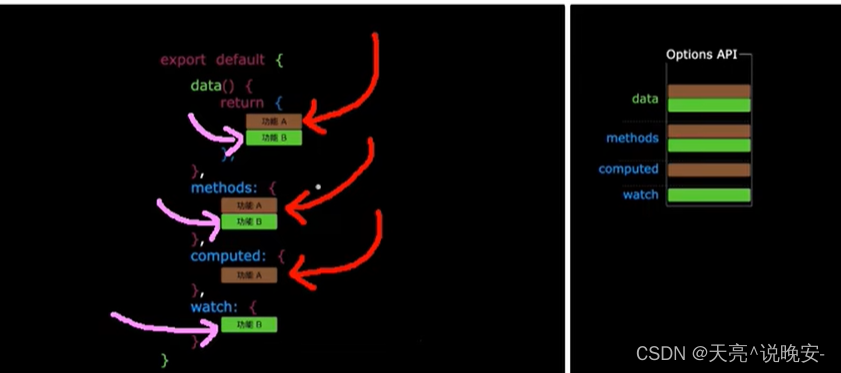
2.Composition API 的优势
我们可以更加优雅的组织我们的代码,函数。让相关功能的代码更加有序的组织在一起。
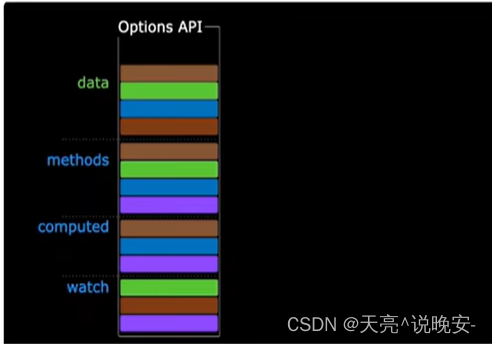
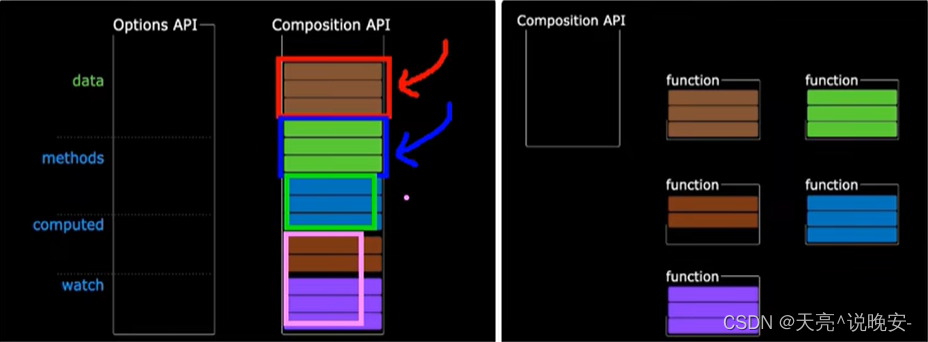
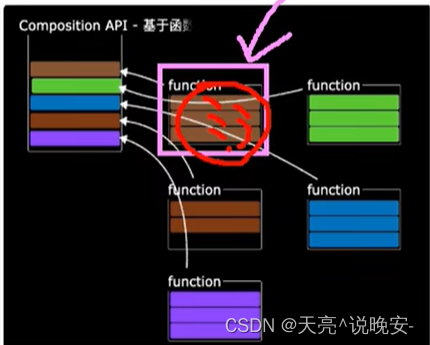
五、新的组件
1.Fragment
- 在Vue2中: 组件必须有一个根标签
- 在Vue3中: 组件可以没有根标签, 内部会将多个标签包含在一个Fragment虚拟元素中
- 好处: 减少标签层级, 减小内存占用
2.Teleport
-
什么是Teleport?——
Teleport是一种能够将我们的组件html结构移动到指定位置的技术。我是一个弹窗
- 1
- 2
- 3
- 4
- 5
- 6
- 7
- 8
用之前效果:
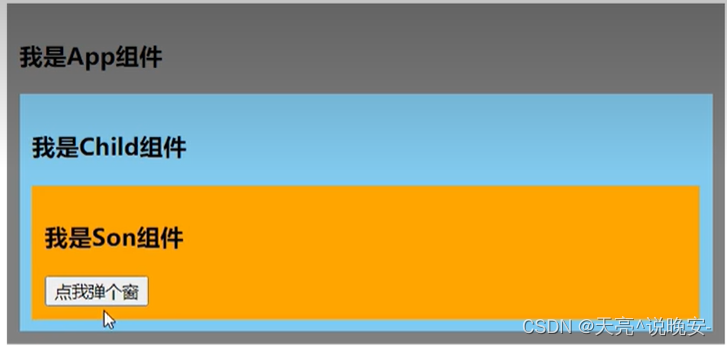
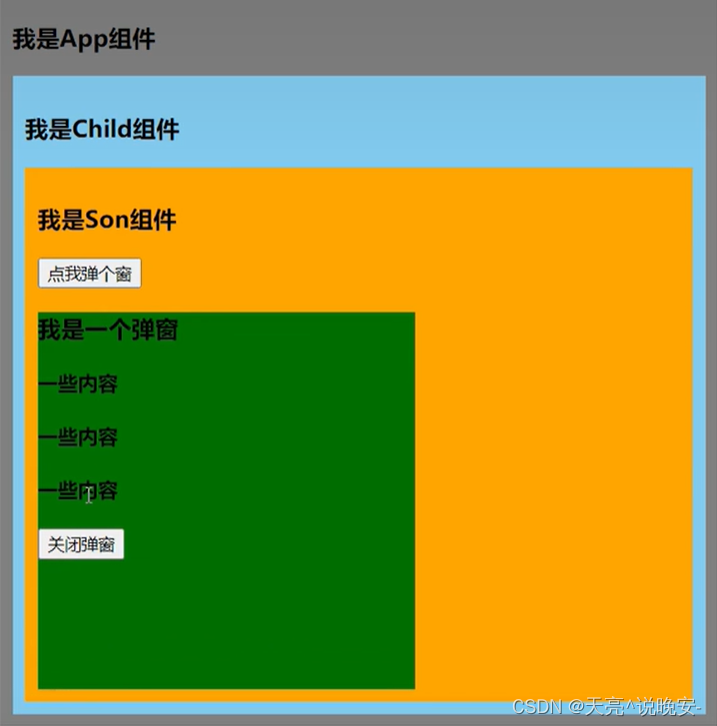

代码实现:
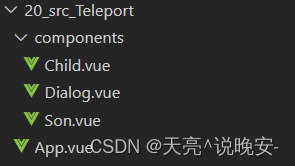
App.vue <template> <div class="app"> <h3>我是App组件h3> <Child/> div> template> <script> import Child from './components/Child' export default { name:'App', components:{Child}, } script> <style> .app{ background-color: gray; padding: 10px; } style>- 1
- 2
- 3
- 4
- 5
- 6
- 7
- 8
- 9
- 10
- 11
- 12
- 13
- 14
- 15
- 16
- 17
- 18
- 19
- 20
- 21
- 22
Child.vue <template> <div class="child"> <h3>我是Child组件h3> <Son/> div> template> <script> import Son from './Son' export default { name:'Child', components:{Son}, } script> <style> .child{ background-color: skyblue; padding: 10px; } style>- 1
- 2
- 3
- 4
- 5
- 6
- 7
- 8
- 9
- 10
- 11
- 12
- 13
- 14
- 15
- 16
- 17
- 18
- 19
- 20
- 21
- 22
Son.vue <template> <div class="son"> <h3>我是Son组件h3> <Dialog/> div> template> <script> import Dialog from './Dialog.vue' export default { name:'Son', components:{Dialog} } script> <style> .son{ background-color: orange; padding: 10px; } style>- 1
- 2
- 3
- 4
- 5
- 6
- 7
- 8
- 9
- 10
- 11
- 12
- 13
- 14
- 15
- 16
- 17
- 18
- 19
- 20
- 21
- 22
Dialog.vue <template> <div> <button @click="isShow = true">点我弹个窗button> <teleport to="body"> <div v-if="isShow" class="mask"> <div class="dialog"> <h3>我是一个弹窗h3> <h4>一些内容h4> <h4>一些内容h4> <h4>一些内容h4> <button @click="isShow = false">关闭弹窗button> div> div> teleport> div> template> <script> import {ref} from 'vue' export default { name:'Dialog', setup(){ let isShow = ref(false) return {isShow} } } script> <style> .mask{ position: absolute; top: 0;bottom: 0;left: 0;right: 0; background-color: rgba(0, 0, 0, 0.5); } .dialog{ position: absolute; top: 50%; left: 50%; transform: translate(-50%,-50%); text-align: center; width: 300px; height: 300px; background-color: green; } style>- 1
- 2
- 3
- 4
- 5
- 6
- 7
- 8
- 9
- 10
- 11
- 12
- 13
- 14
- 15
- 16
- 17
- 18
- 19
- 20
- 21
- 22
- 23
- 24
- 25
- 26
- 27
- 28
- 29
- 30
- 31
- 32
- 33
- 34
- 35
- 36
- 37
- 38
- 39
- 40
- 41
- 42
- 43
- 44
- 45
- 46
用之后效果:
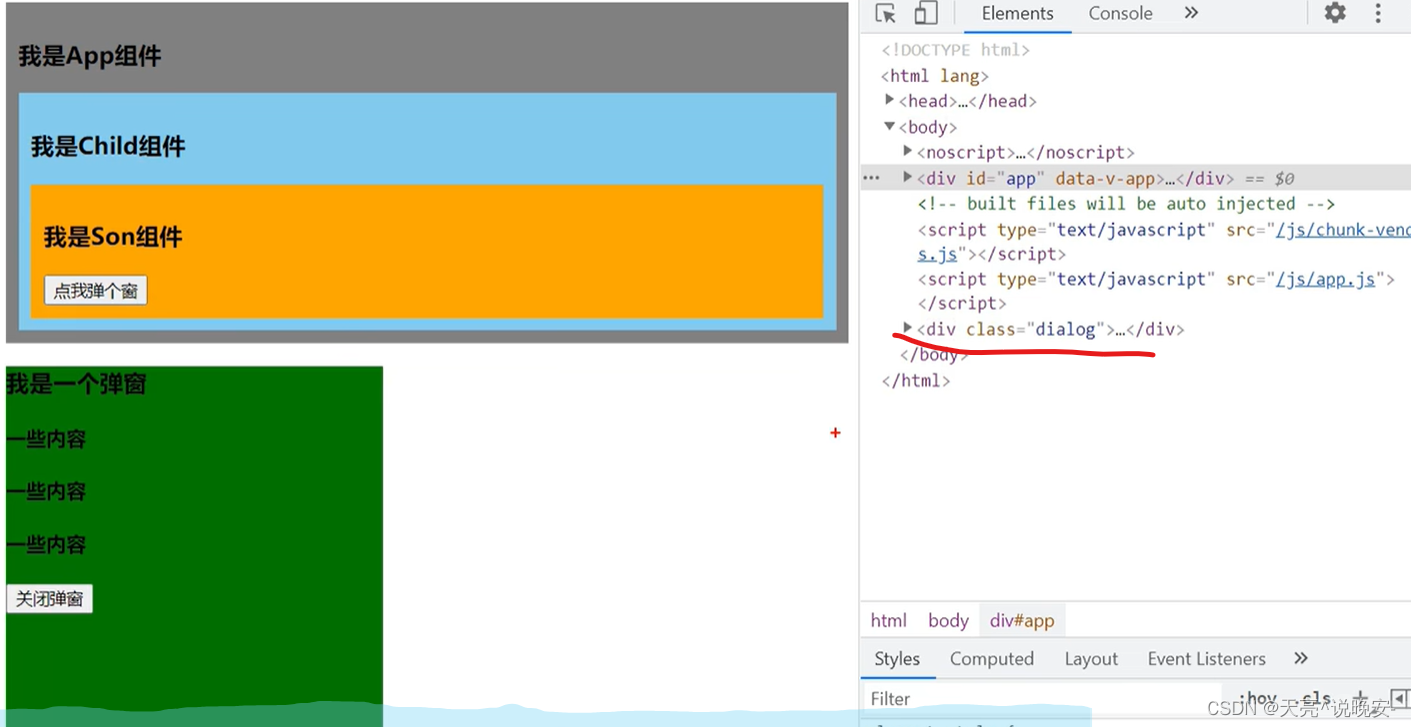
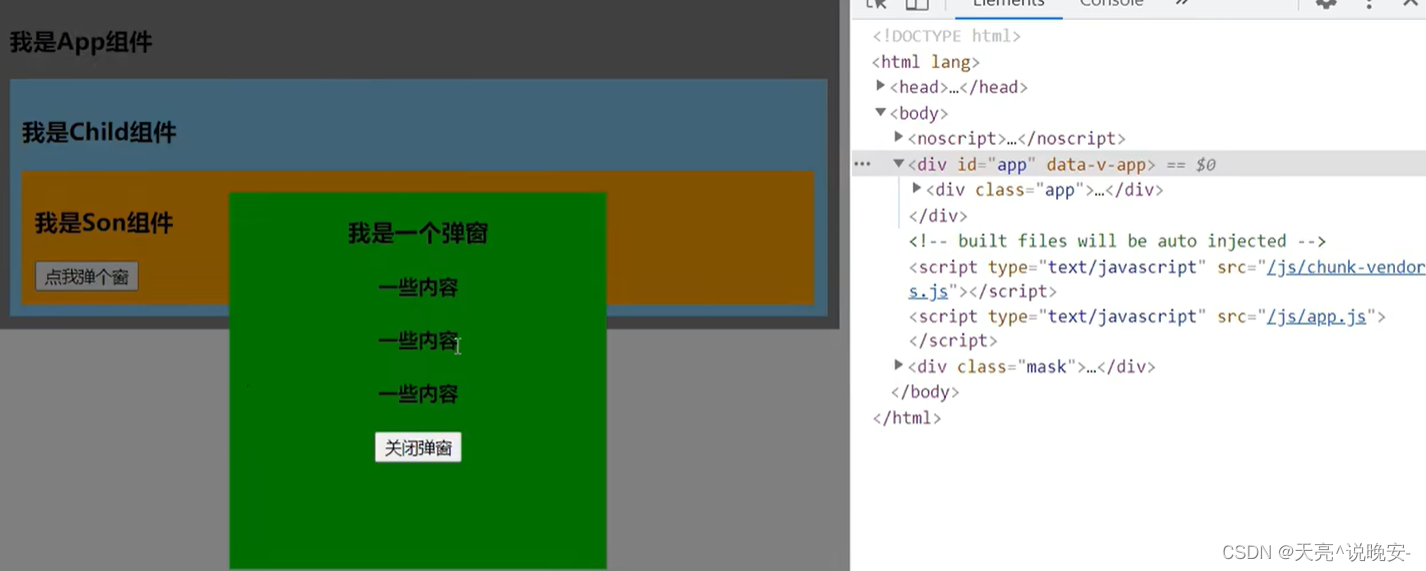
3.Suspense
-
等待异步组件时渲染一些额外内容,让应用有更好的用户体验
-
使用步骤:
-
异步引入组件
import {defineAsyncComponent} from 'vue' const Child = defineAsyncComponent(()=>import('./components/Child.vue'))- 1
- 2
-
使用
Suspense包裹组件,并配置好default与fallback我是App组件
加载中.....
- 1
- 2
- 3
- 4
- 5
- 6
- 7
- 8
- 9
- 10
- 11
- 12
- 13
-
App.vue <template> <div class="app"> <h3>我是App组件h3> <Suspense> <template v-slot:default> <Child/> template> <template v-slot:fallback> <h3>稍等,加载中...h3> template> Suspense> div> template> <script> // import Child from './components/Child'//静态引入,组件同时出现。只要没有成功,就不渲染 import {defineAsyncComponent} from 'vue' const Child = defineAsyncComponent(()=>import('./components/Child')) //异步引入,App先出,Child后出。Suspense可解决显示效果不好,添加插槽 export default { name:'App', components:{Child}, } script> <style> .app{ background-color: gray; padding: 10px; } style>- 1
- 2
- 3
- 4
- 5
- 6
- 7
- 8
- 9
- 10
- 11
- 12
- 13
- 14
- 15
- 16
- 17
- 18
- 19
- 20
- 21
- 22
- 23
- 24
- 25
- 26
- 27
- 28
- 29
- 30
- 31
Child.vue <template> <div class="child"> <h3>我是Child组件h3> {{sum}} div> template> <script> import {ref} from 'vue' export default { name:'Child', async setup(){ let sum = ref(0) let p = new Promise((resolve,reject)=>{ setTimeout(()=>{ resolve({sum}) },3000) }) return await p } } script> <style> .child{ background-color: skyblue; padding: 10px; } style>- 1
- 2
- 3
- 4
- 5
- 6
- 7
- 8
- 9
- 10
- 11
- 12
- 13
- 14
- 15
- 16
- 17
- 18
- 19
- 20
- 21
- 22
- 23
- 24
- 25
- 26
- 27
- 28
- 29
- 30

六、其他
1.全局API的转移
-
Vue 2.x 有许多全局 API 和配置。
-
例如:注册全局组件、注册全局指令等。
//注册全局组件 Vue.component('MyButton', { data: () => ({ count: 0 }), template: '' }) //注册全局指令 Vue.directive('focus', { inserted: el => el.focus() }- 1
- 2
- 3
- 4
- 5
- 6
- 7
- 8
- 9
- 10
- 11
- 12
-
-
Vue3.0中对这些API做出了调整:
-
将全局的API,即:
Vue.xxx调整到应用实例(app)上2.x 全局 API( Vue)3.x 实例 API ( app)Vue.config.xxxx app.config.xxxx Vue.config.productionTip 移除 Vue.component app.component Vue.directive app.directive Vue.mixin app.mixin Vue.use app.use Vue.prototype app.config.globalProperties
-
2.其他改变
-
data选项应始终被声明为一个函数。
-
过度类名的更改:
-
Vue2.x写法
.v-enter, .v-leave-to { opacity: 0; } .v-leave, .v-enter-to { opacity: 1; }- 1
- 2
- 3
- 4
- 5
- 6
- 7
- 8
-
Vue3.x写法
.v-enter-from, .v-leave-to { opacity: 0; } .v-leave-from, .v-enter-to { opacity: 1; }- 1
- 2
- 3
- 4
- 5
- 6
- 7
- 8
- 9
-
-
移除keyCode作为 v-on 的修饰符,同时也不再支持
config.keyCodes -
移除
v-on.native修饰符-
父组件中绑定事件
- 1
- 2
- 3
- 4
-
子组件中声明自定义事件
- 1
- 2
- 3
- 4
- 5
-
-
移除过滤器(filter)
过滤器虽然这看起来很方便,但它需要一个自定义语法,打破大括号内表达式是 “只是 JavaScript” 的假设,这不仅有学习成本,而且有实现成本!建议用方法调用或计算属性去替换过滤器。
-
…
-
相关阅读:
Aop天花板
Intel带你初识视觉识别--OpenVINO
【爬虫实战】用python爬今日头条热榜TOP50榜单!
找出字符串中第一个匹配项的下标
Jekyll 语句语法、功能的实现方法和结构介绍小手册
机器学习概论
通过 filesystem 的 inode 设计,理解数组与链表
b2b.ccb.com:443 需要你的凭据
2022年全球及中国工厂模拟软件行业头部企业市场占有率及排名调研报告
ASP.NET Core如何禁用模型验证(或者从模型状态中移除某些属性)?
- 原文地址:https://blog.csdn.net/m0_52896752/article/details/127777974
